Evaluation of the disclosure data of sustainability reports in the context of industry 4.0: A case study in seven countries
The paper introduces a popular measure to evaluate the quality of the information disclosure
of companies’ sustainability reports and apply to the case studies of large enterprises
operating business in the forest and paper industry from seven countries: Brazil, Canada,
Japan, Finland, South Africa, Sweden, and the United States. The Clarkson et al’s (2008)
scale is the main tool used to evaluate the disclosure quality of data. The writers also use the
mean of scores in each category and country to make the comparisons. Hard disclosure and
soft disclosure are also used to evaluate the performance in publishing information of
enterprises. The paper reports that there are substantial differences between
comprehensiveness between countries. The preferences of each company to what kind of data
they reveal most are also distinctive. There are numbers of explanations to justify those
differences, which include the cultural variety, and the legislation system in each nation.
Above all, we find that companies who are better equipped with smart 4.0 technology (1) use
energy more efficiently; (2) are better in waste and disposal management; (3) reduce
greenhouse emissions and (4) cause to a lesser extent the impacts on protected and
unprotected areas high in biodiversity. Meanwhile, there is also a positive relationship
between environmental performance indicators and countries that own higher percentage of
smart technology utilization with Japan on top and South Africa at the bottom. Finally, there
are also similarities in the popular adoption standard ISO 14001, and the hesitation of the
most firms analysed in disclosing information related with the social aspects.
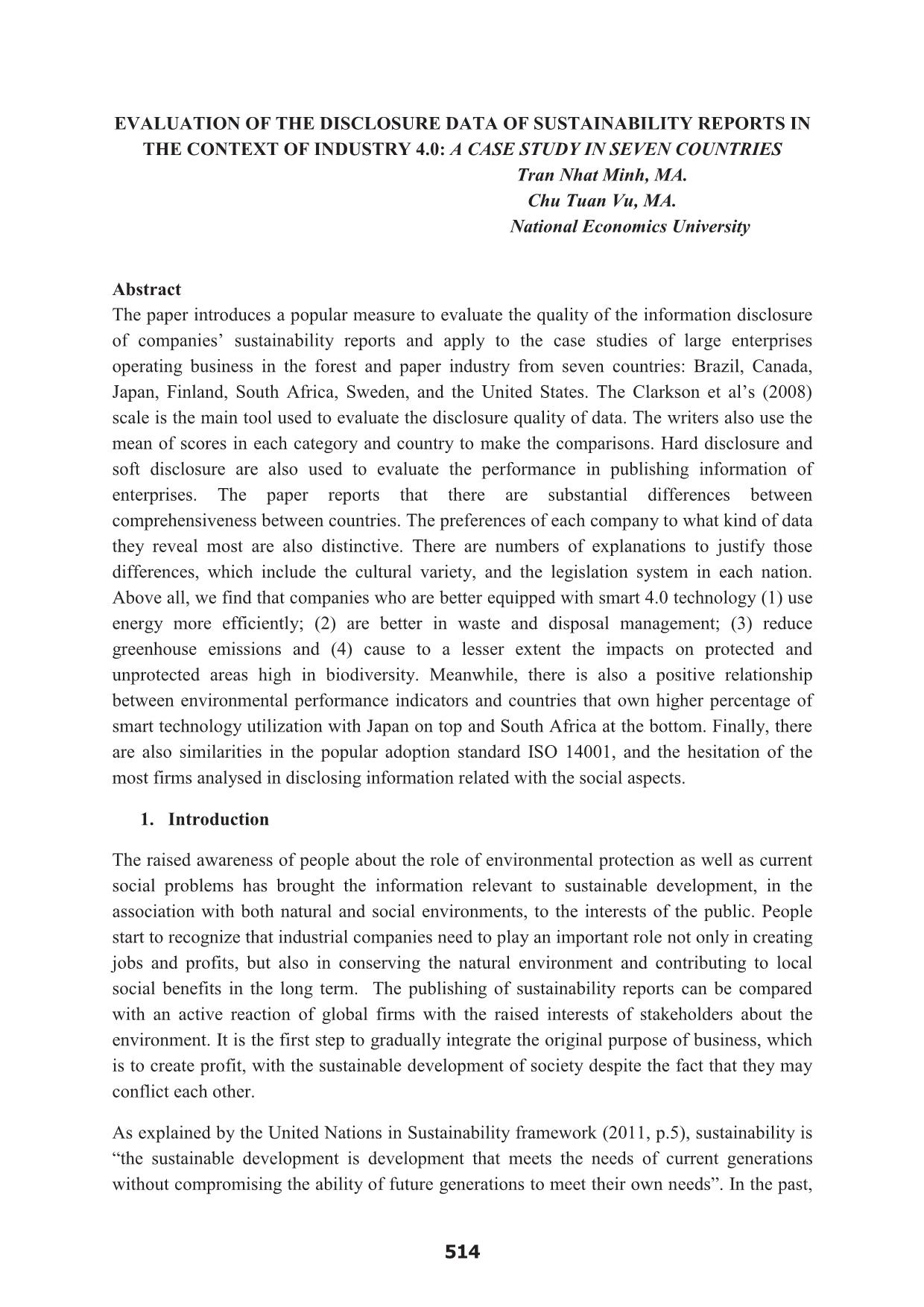
Trang 1
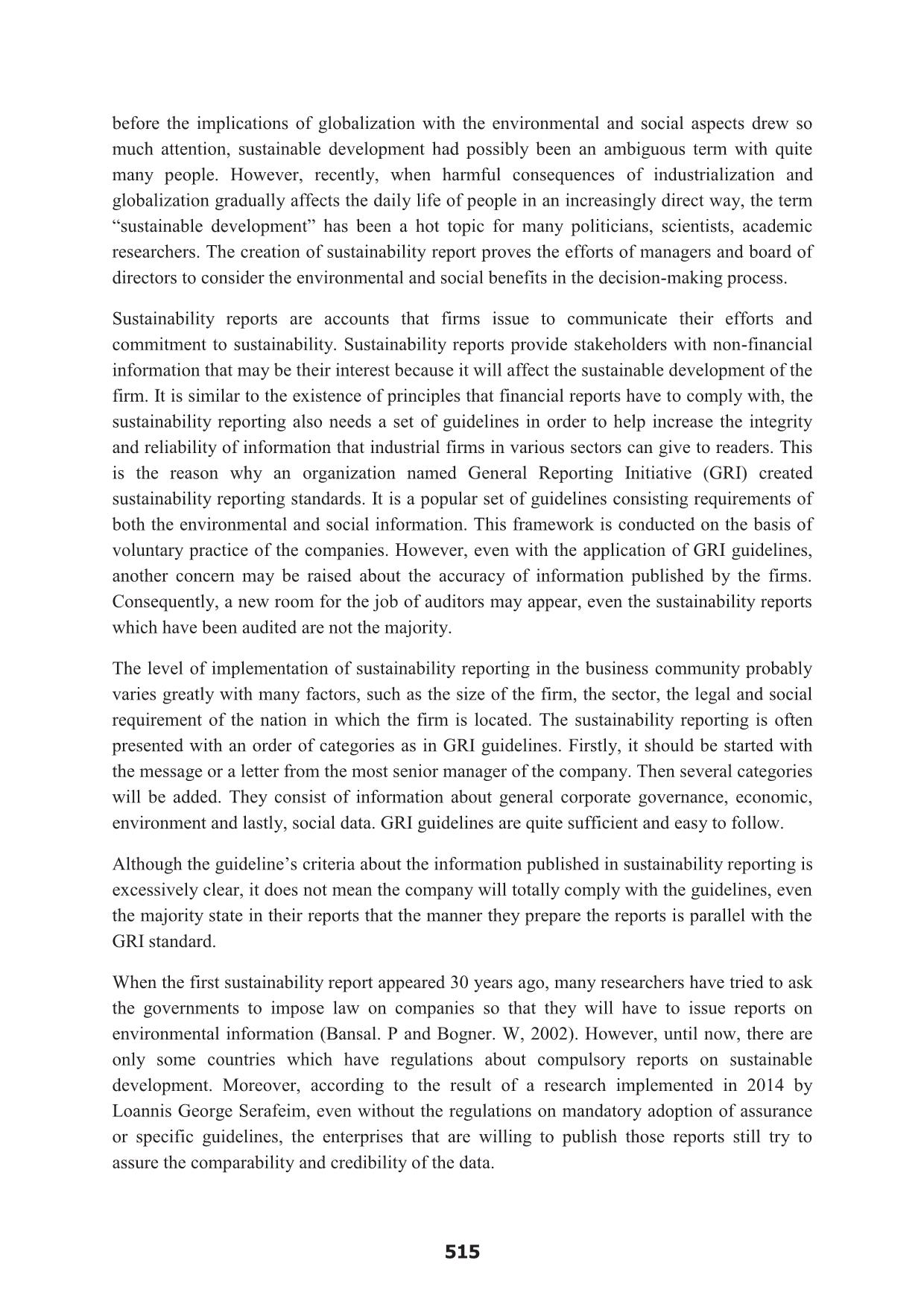
Trang 2
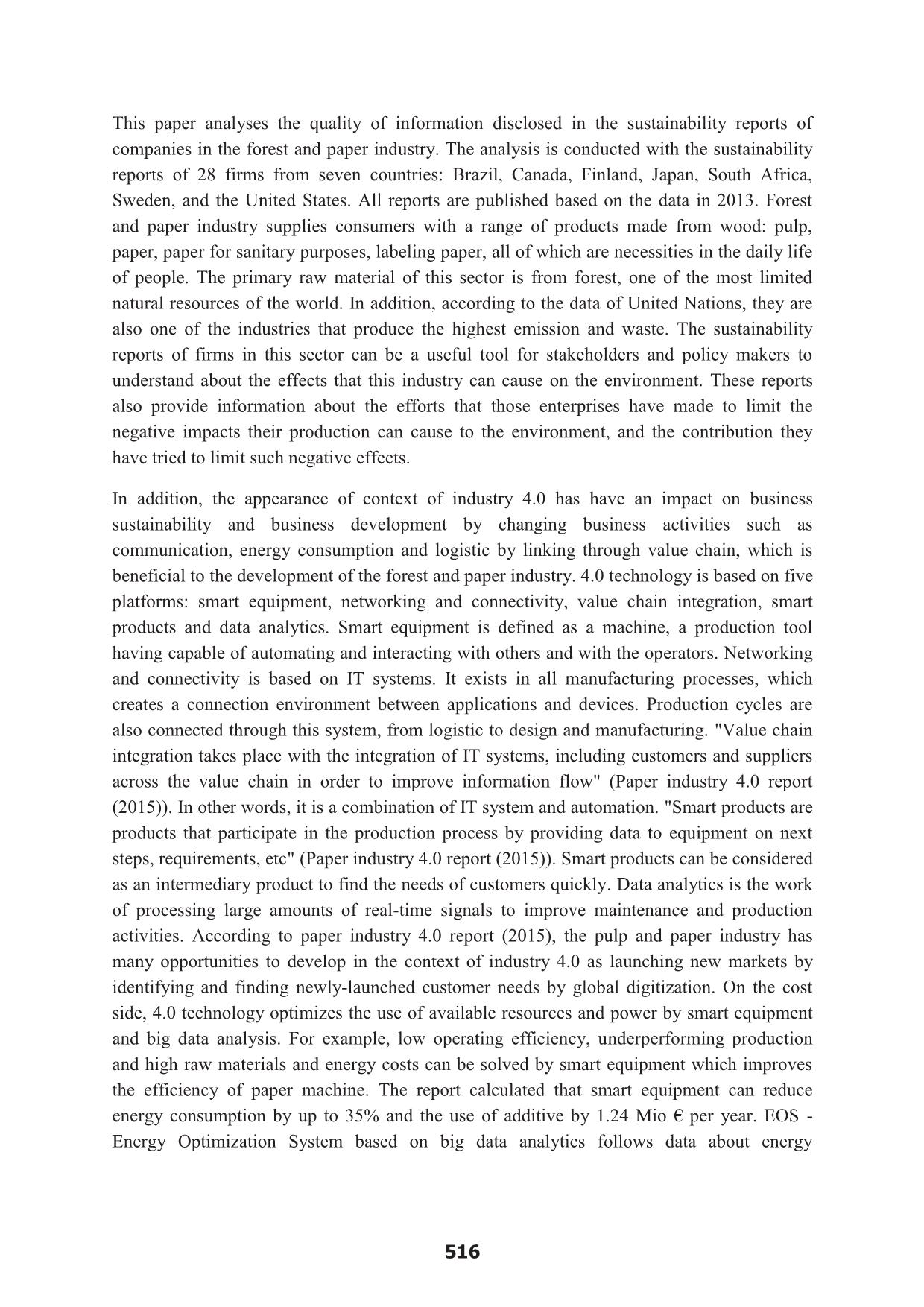
Trang 3
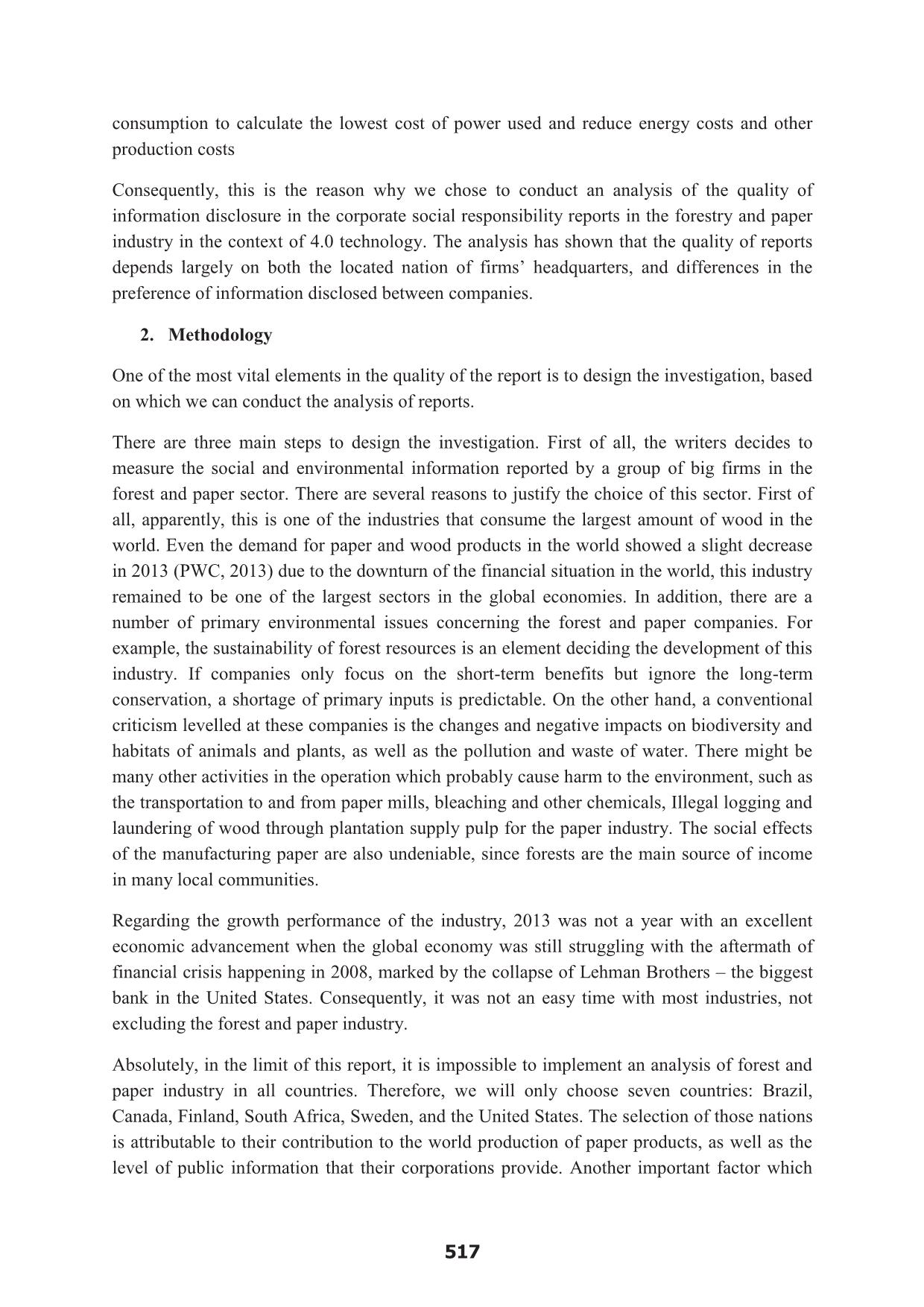
Trang 4
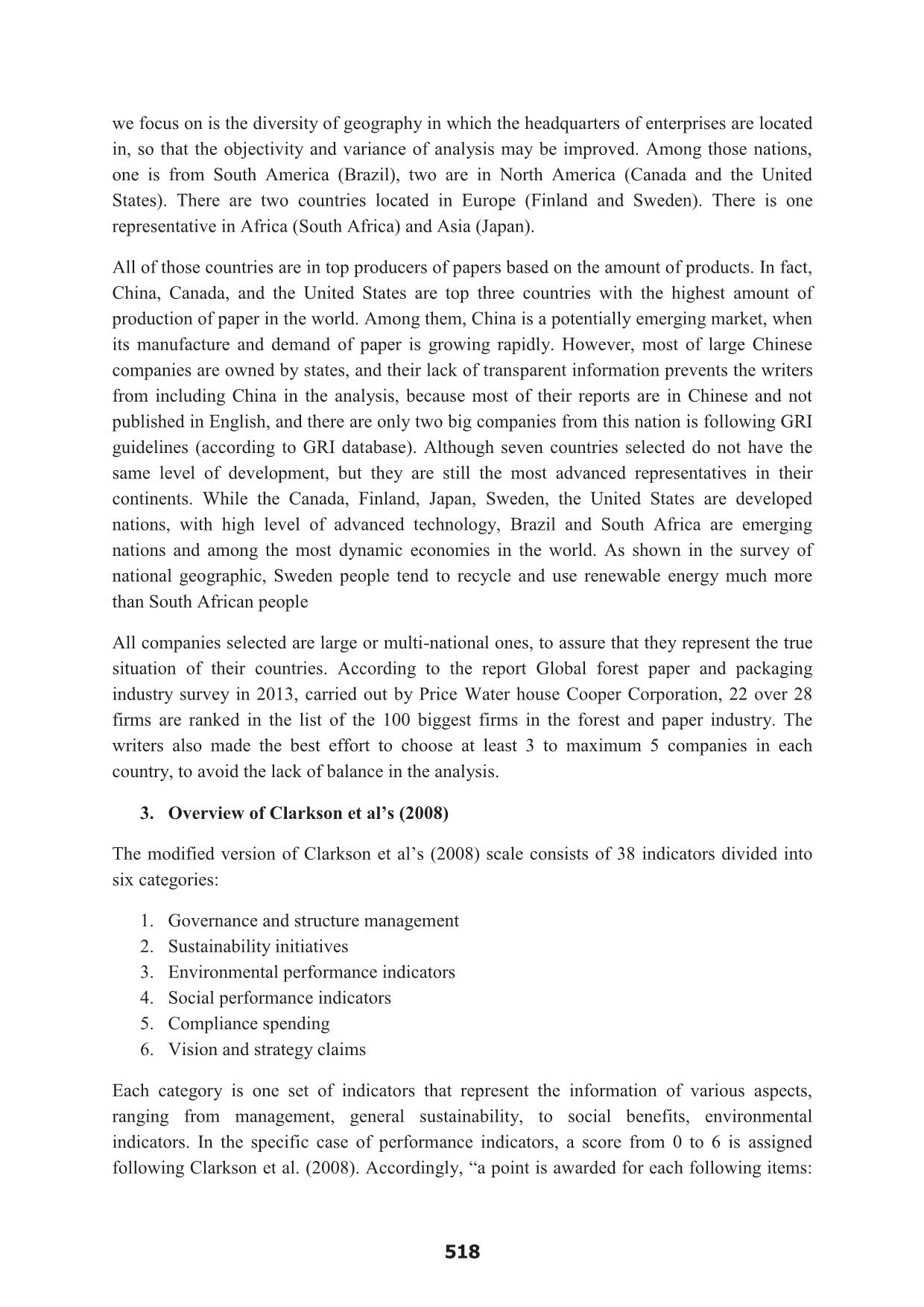
Trang 5
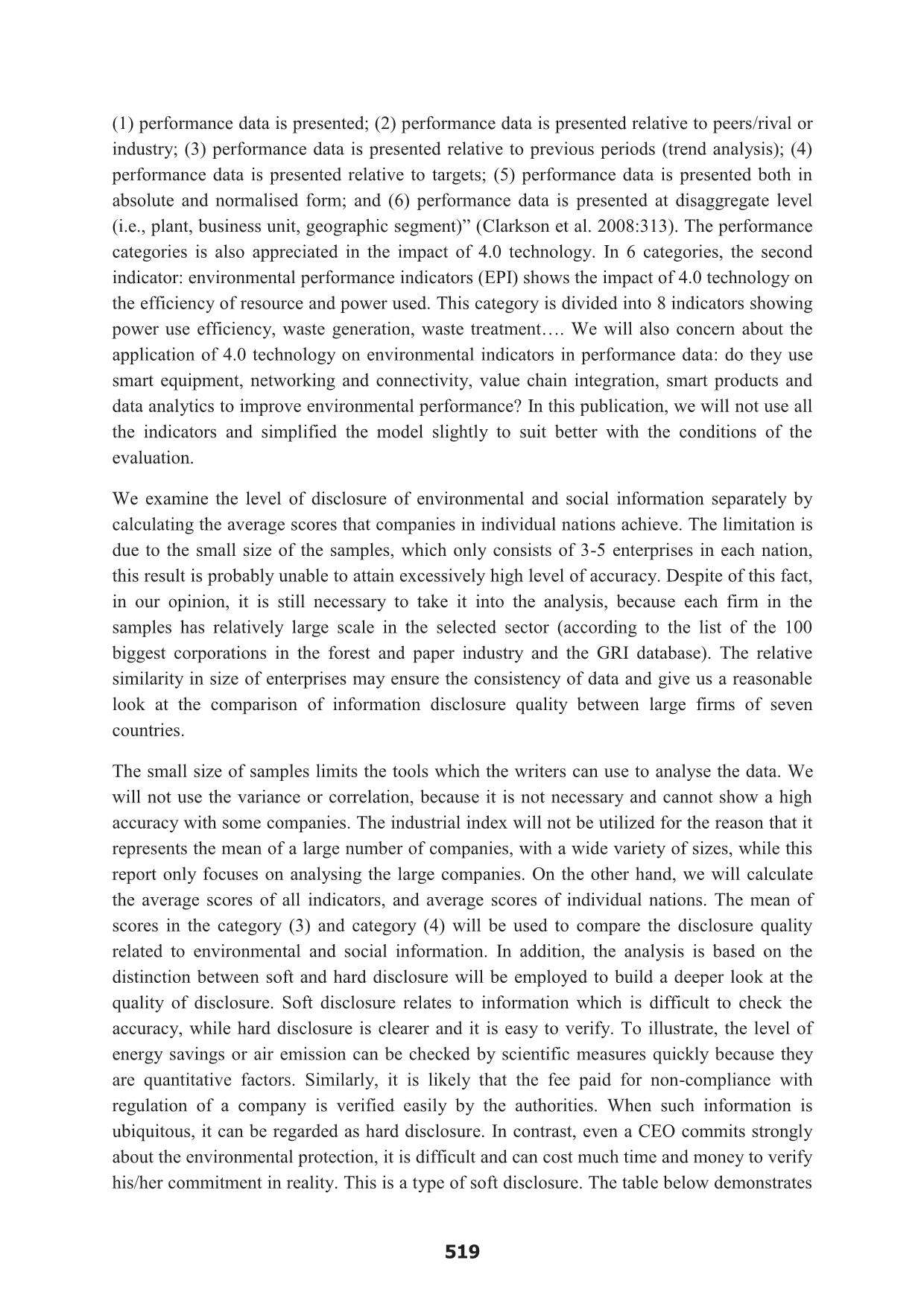
Trang 6
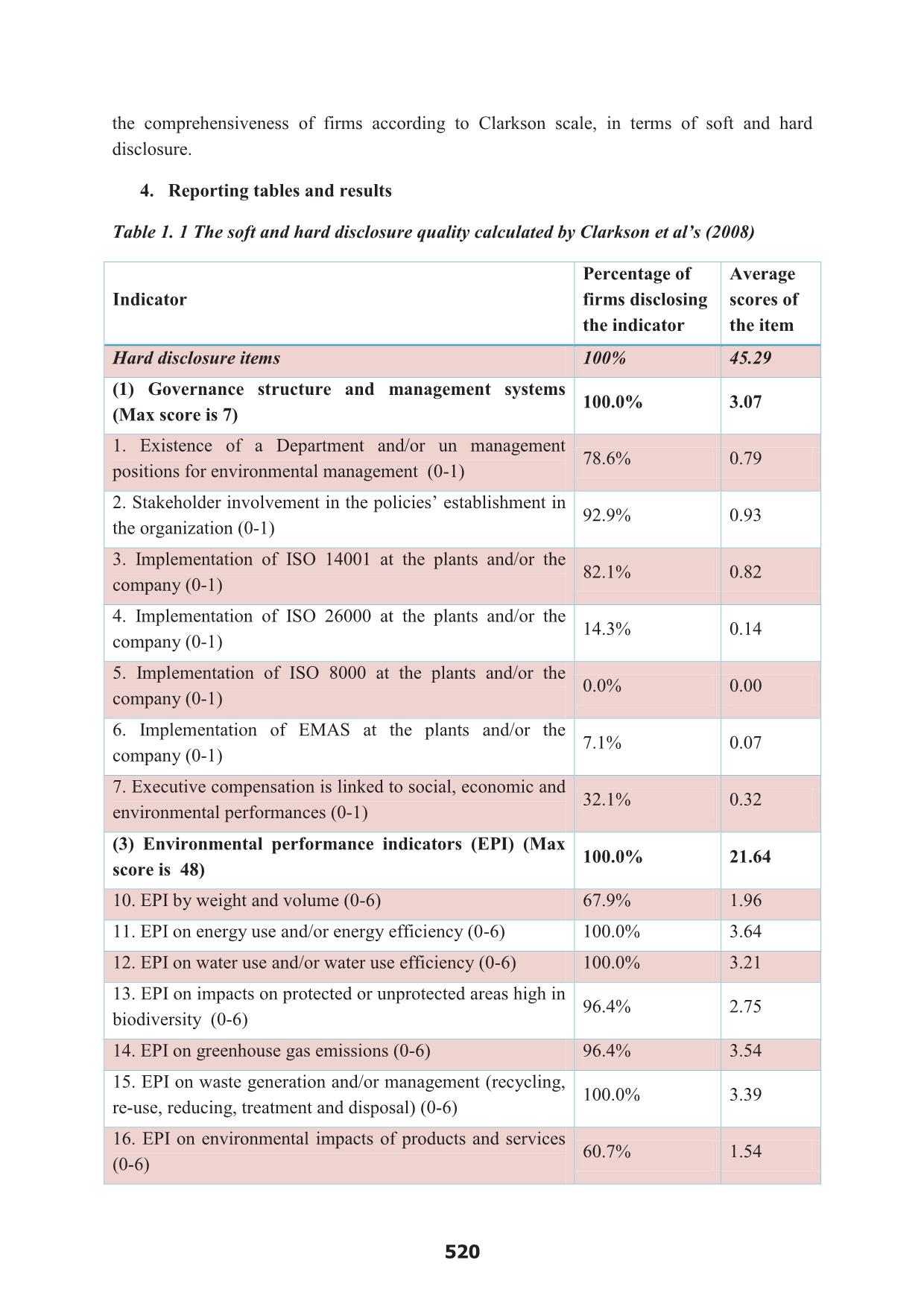
Trang 7
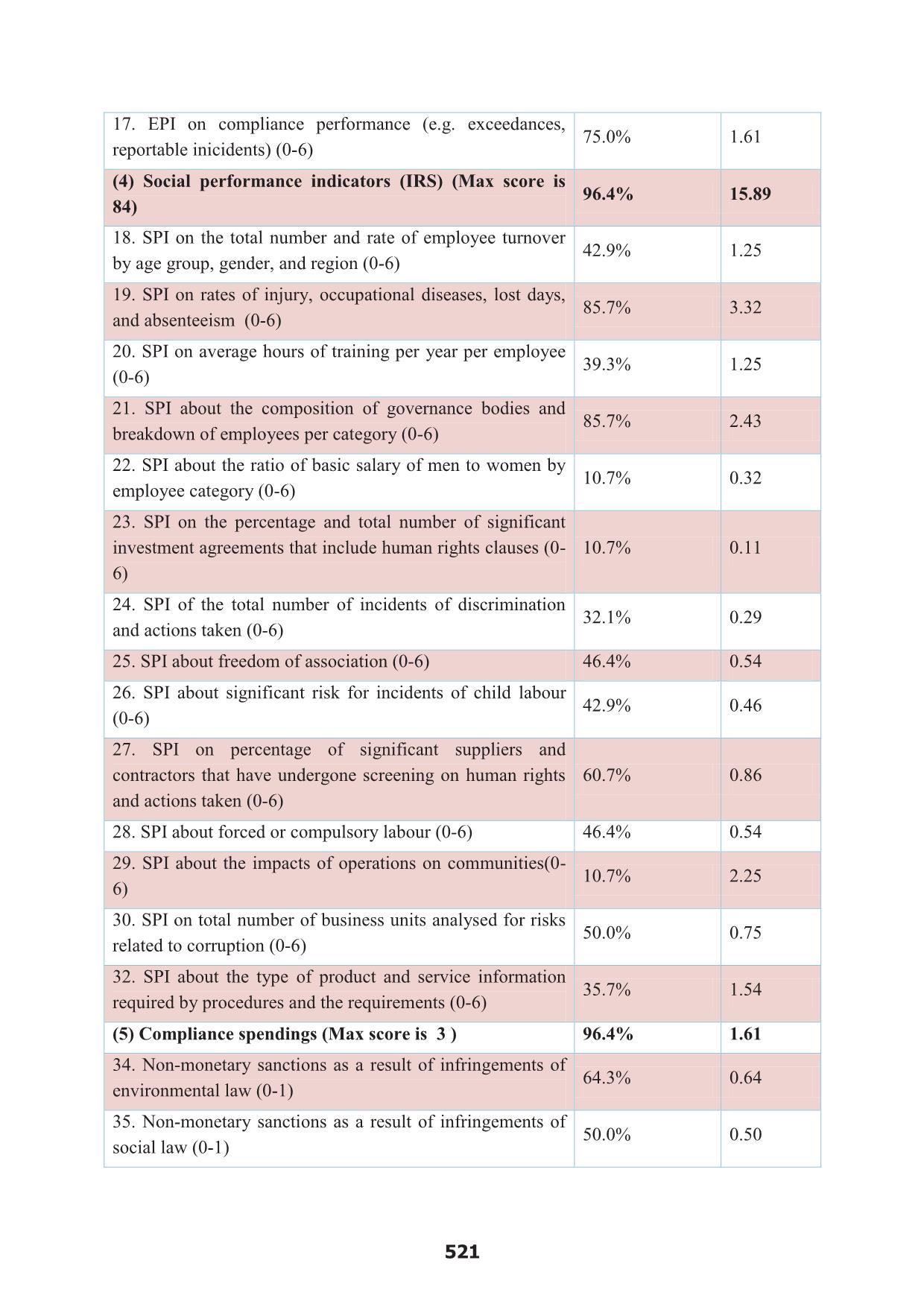
Trang 8
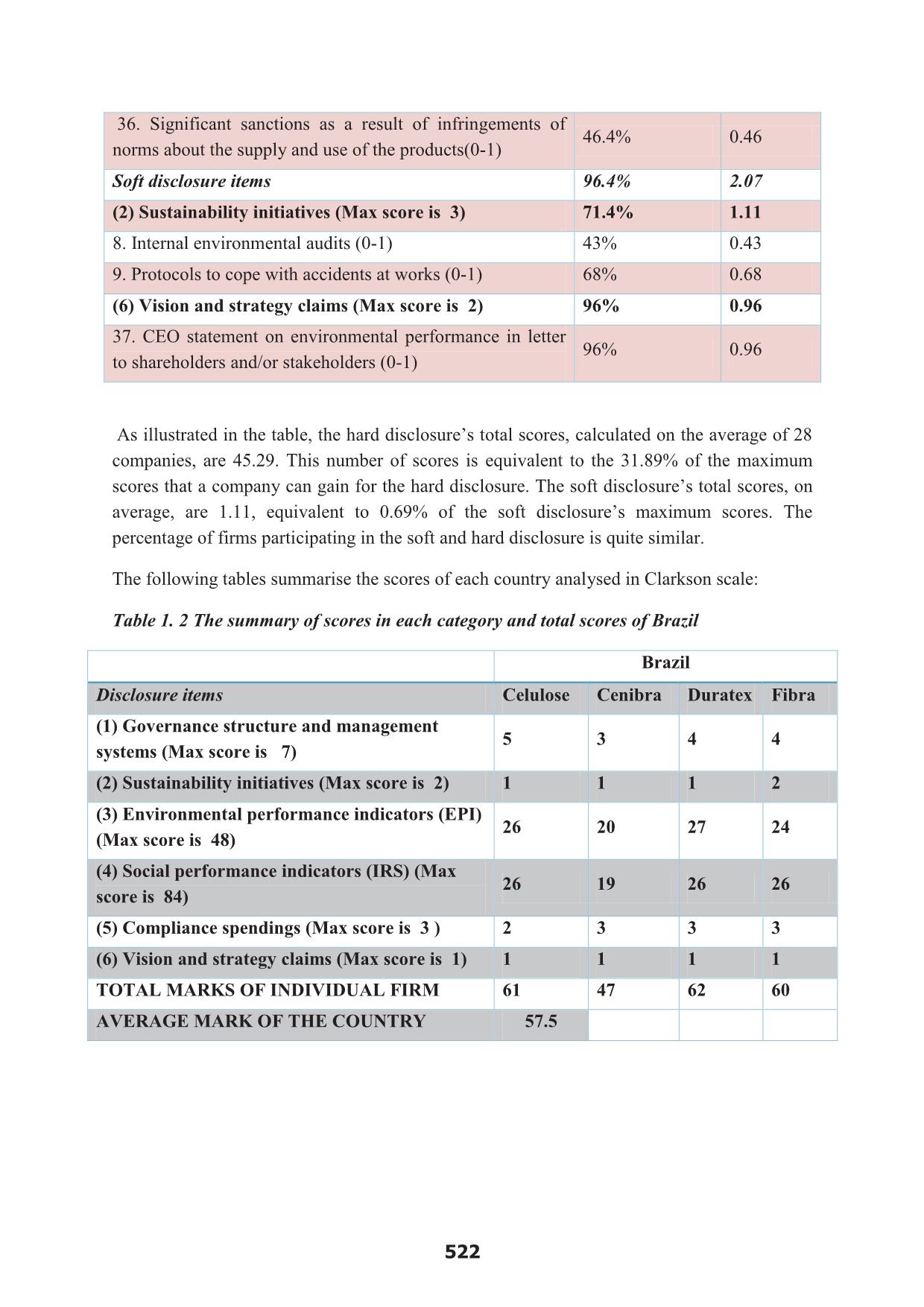
Trang 9
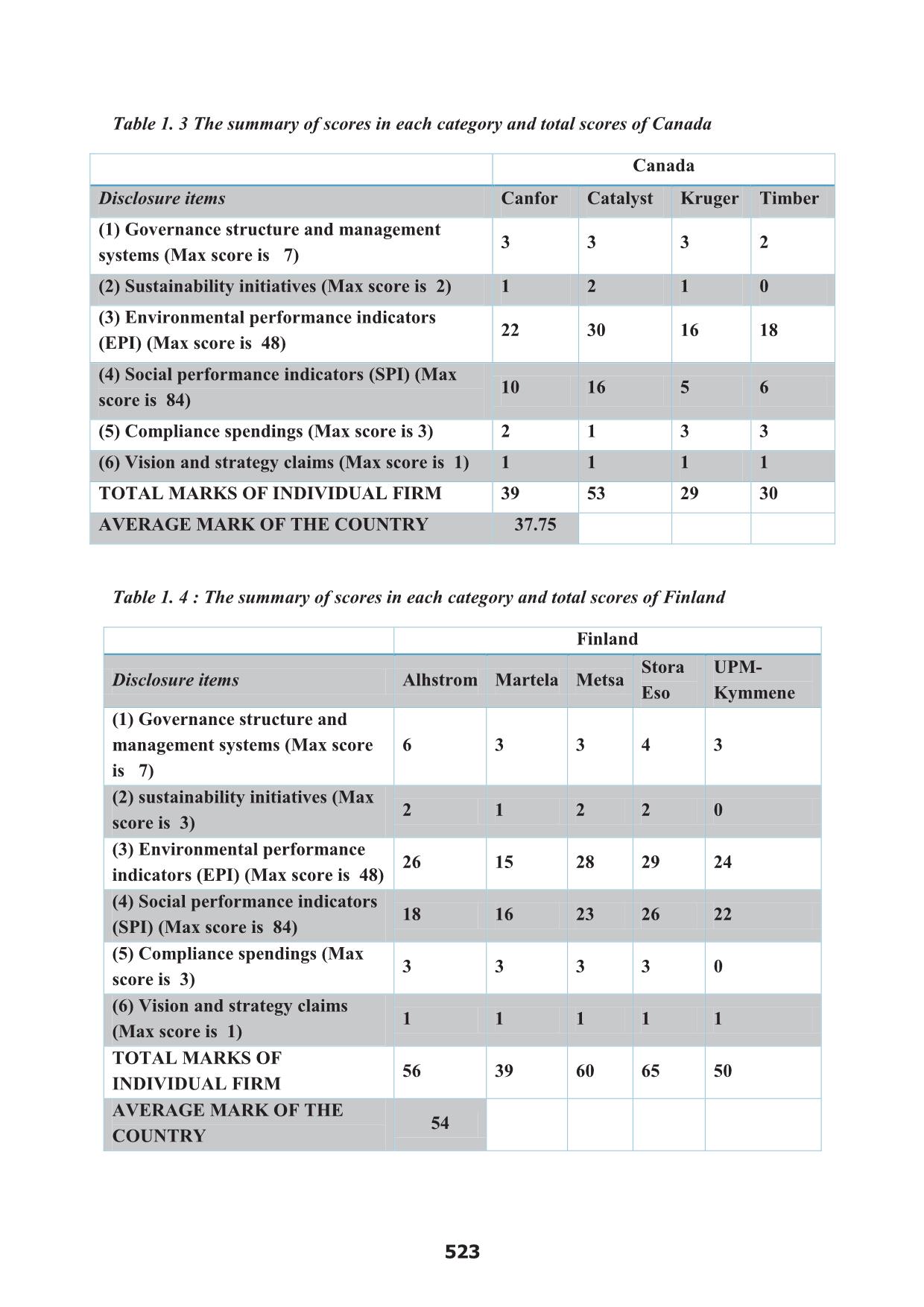
Trang 10
Tải về để xem bản đầy đủ
Tóm tắt nội dung tài liệu: Evaluation of the disclosure data of sustainability reports in the context of industry 4.0: A case study in seven countries
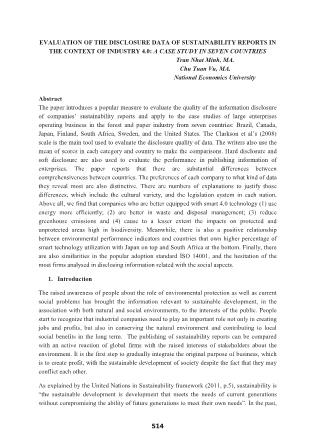
rmation. One of the most vital drivers is to encourage the progress of social development and raising the awareness of corporations about environmental protection. However, with a level of social development at the top of the world, it is likely that the stakeholders in Sweden felt it unnecessary to have specific sustainability reports. Reasonably, when there is no mandatory regulation from the government and customers do not pay too much attention to the environmental and social information disclosed by the companies, they have no motivations to invest time and money in producing sustainability reports with high quality. The story of Finland is a little different. The social corporate sustainability report started to appear in Finland since the 1980s. Corporations in Finland used to have different approaches in presentation of social and environmental information. Along with time, the integrity of sustainability reports in Finland increased and it became one of the nation’s 528 leading in integrating the environmental performance and financial performance (Matias Laine, 2009). One of the primary reason may be Finland is a stakeholder of GRI and participating extremely active in this organization. In other words, we can say Finland has been successful in movements towards an environment-oriented business. The study of Hannu Schadewitz and Mikael Niskala (2010) also confirmed that the inclusion of corporate social responsibility information in annual reports improved the communication between Finnish companies and stakeholders, and therefore increase the value of firms. Stora Enso is a typical example of how a Finnish firm, after getting acquainted with corporate social responsibility, now has considered it as an inevitable goal of business rather than a pure responsibility. According to Matias Laine (2009), in Stora Enso Sustainability Report, 2005, p. 6, the company defines sustainability as ‘an umbrella term to describe responsible business operations that include economic, environmental and social responsibility’. North American companies in this report have the lowest scores among seven countries in the analysis. Regarding the United States, the downturn of the economies and the puzzle of financial crisis that originated from this country probably attracted more attention from stakeholders than the social corporate responsibility. The goal of sustainable development had to be put after the profit growth and economic operating efficiency. Therefore, reacting with the demand stakeholders, especially the shareholders, is likely to be the most reasonable explanation for the low quality of disclosure of American companies. This argument may be supported by a study of Giacomo Boesso (2006) which shows that the complexity of the market is one of the factors influencing the sustainability reports of American companies. In term of environmental performance indicator, the case of USA should be concerned because of its low point. Obviously, the insignificant application of 4.0 technology makes US companies less “confident” to show data on this indicator. The low scores that Japanese companies gain in the scale seem to be a surprise, because Japan is one of the most active participants in the trend of sustainability reporting. According to data updated by GRI in 2010, the number of sustainability reports in Japan following GRI scheme was in the top four of the world, accounting for 7% of the total reports globally. However, the cultural differences between Japan, an Asian conventional country and European nations, created the different manner and approach to sustainability reports. The hesitation to reveal operating data in social aspect is not only popular in the forest and paper industry, but is the general situation in all Japanese sectors (A. Kolk, 2005, p.41). As the data in this report reveal, Japanese companies tend to focus more on environmental issues rather than social problems. This is not unexpected because Japan has always been a technology early adopter of improving resource efficiency, recycling and minimizing waste. Another reasonable explanation may be because Japanese people, as many other Asian countries, have the tradition of not showing too much about the internal problems, in a family, or a corporation, to outsiders. The sensitive issues, such as the gender equality, can be mentioned in the reports, but rarely with specific data. The traditional culture prevents Japan from the complete convergence with the global trend, despite of the growing number of 529 Japanese companies following Europe and the United States to publish sustainability reports (Kanji Tanimoto and Kenji Suzuki, 2005). 6. Conclusion The paper concentrates on analysing the disclosure quality of information in the sustainability reports of the largest firms in seven countries in the forest and paper industry in 2013. The limitation of the sample’s small size is unavoidable due to the limited choices of large firms publishing sustainability reports in 2013. On the other hand, there are some vital implications which still can be withdrawn, and they are not limited only in the sector of forest and paper industry. Firstly, we can see that higher level of development of social and environmental awareness in a country does not accompany with the disclosure quality. The best illustrations are Sweden, Canada and the United States. The only developed nation, revealing the high quality in corporate social responsibility reports, is Finland, which can be deemed to have reached a real success to some extents in integrating the sustainable development with the core business. Among seven countries, Japan seems to be affected mostly by conventional culture. Although it is one of the economies following the trend of sustainability reporting most enthusiastically, Japan still has a long way to go to apply sustainability reporting usefully. In the context of the forest and paper sector, due to its nature of depending largely on natural resources and relating closely with local communities, sustainability reporting plays an extremely necessary role in evaluating the impacts on environment of business operation. The large corporations probably understand this thing clearly, and they use the most of their sustainability reports revealing the advanced technology, new applied standards, investment in projects to support the local communities. It may be a positive sign, but people should not be too optimistic about what is shown in the data published by them. Due to the voluntary nature of corporate social responsibility reports, it is reasonable to believe that most of the businesses only show what they want the public to know. Another meaningful conclusion is that the increasing quantity of sustainability reports does not ensure the high quality of information disclosed. As a big picture, there is an imbalance between social and environmental data shown in the reports. The social issues disclosure is being deemed as a compulsory responsibility, which must be included in the report, rather than a necessary and useful part. The gender equality, as one of the most unclear aspects of the sample reports, is a typical illustration. In fact, this social issue has been a conventionally debated issue in all sectors, and the forest and paper manufacturing is not an exception. It is not easy to find a solution to this problem, simply because it has been mentioned for a long time, but still appears in almost every nation, every sector in the world, in spite of strong efforts of activists, governments, and people against the sexual discrimination. However, from our point of view, the stronger regulation on the requirements of data disclosure may be an appropriate approach to some extents. The biggest hurdle is 530 possibly the disapproval of business communities with the excuse that the salary is not the only indicator of gender equality. On the other hand, if the governments could mandate firms to publish data on salary differences between men and women, it would be a vital turning point. As a manager answered the interview in the paper of Kate Grosser and Jeremy Moon (2008, p.12): “If you uncover something, you have to put it right”. The pressure from stakeholders, such as customers and non-government organization, will be the motivation for firms to improve the performance of gender equality. And this is when the original purpose of sustainability reporting is really achieved. Nevertheless, the mandatory regulation is not the only applicable answer. More than any official law, the high awareness of important stakeholders, such as customers and shareholders, is the strongest driver to make companies disclose data and try to reduce sexual discrimination. The answer to this puzzle must be a combination of efforts from all parties, and the target of equal treatment in working place cannot be reached in the short term. Last but not least, the pulp, paper and forest industry is still at an early phase of developing and participating in Industry 4.0. In order to take advantage of the key future opportunities, companies should take some of the following steps first. The industry players ought to seek greater collaboration with suppliers, customers and other stakeholders in the development of their jointly-funded Industry 4.0 pilot projects. In other words, 4.0 strategies should be set up not only at one firm, but also in the whole value chain. Firms should unfold their accumulated skills and experiences and clearly communicate with other participants in the whole value chain. Finally, firms should be proactive to identify the opportunities related to Industry 4.0, integrating smart technologies into their strategic management. To conclude, the trend of sustainability reporting has been motivated by a number of drivers. Its positive effects on the disclosure of social and environmental information are undeniable, but the achievement of optimal usefulness is still in progress. It is apparent that any firm making applying sustainability reporting hopes to raise their credibility with stakeholders. However, the key point is whether they provide accurate information or not. The assurance of auditors can partly verify the accuracy of data, but one should bear in mind that even with financial auditing with a much longer history, the result is only relatively objective. Furthermore, not all firms accept to increase operating expense to employ external auditors. Next, it is crucial that the corporations themselves use sustainability report scheme to improve their performance in promoting sustainable development. Finally, we offer some of the 4.0 initiatives that firms should implement to become paper and forest market leaders in the age of automation and digitalization. 531 References Adams, c., hill, w. And roberts, c. (1998). Corporate social reporting practices in western europe: legitimating corporate behaviour?. The British Accounting Review, Vol. 30, No. 1, pp.1-21. A.Kolk (2005). Sustainability reporting. Anton, W., Deltas, G. and Khanna, M. (2004). Incentives for environmental self-regulation and implications for environmental performance. Journal of Environmental Economics and Management, Vol. 48, No. 1, pp.632-654. Bansal, P. and Bogner, W. (2002). Deciding on ISO 14001: Economics, Institutions, and Context. Long Range Planning, Vol. 35, No. 3, pp.269-290. Barla, P. (2007). ISO 14001 certification and environmental performance in Quebec's pulp and paper industry. Journal of Environmental Economics and Management, Vol. 53, No. 3, pp.291-306. Barla, P. (2007). ISO 14001 certification and environmental performance in Quebec's pulp and paper industry. Journal of Environmental Economics and Management, Vol. 53, No. 3, pp.291-306. Bertomeu, J. and Marinovic, I. (2011). Disclosure of Hard vs. Soft Information. Boesso, G. and Kumar, K. (2007). Drivers of corporate voluntary disclosure. Acc Auditing Accountability J, Vol. 20, No. 2, pp.269-296. Confederation of European Paper Industries (2015) ‘Paper industry 4.0’. Available at: stry%204.0_170x235mm_20151109.pdf Delmas, m. (2001). Stakeholders and competitive advantage: the case of iso 14001. Production and Operations Management, Vol. 10, No. 3, pp.343-358. Global reporting initiatives (2010) GRI reporting statistics Grosser, K. and Moon, J. (2008). Developments in company reporting on workplace gender equality?. Accounting Forum, Vol. 32, No. 3, pp.179-198. Hedberg, C. and von Malmborg, F. (2003). The Global Reporting Initiative and corporate sustainability reporting in Swedish companies. Corporate Social Responsibility and Environmental Management, Vol. 10, No. 3, pp.153-164. Ioannou, I. and Serafeim, G. (2013). The Consequences of Mandatory Corporate Sustainability Reporting: Evidence from Four Countries. 532 Labuschagne, C., Brent, A. and van Erck, R. (2005). Assessing the sustainability performances of industries. Journal of Cleaner Production, Vol. 13, No. 4, pp.373-385. Laine, M. (2010). Towards Sustaining the Status Quo: Business Talk of Sustainability in Finnish Corporate Disclosures 1987 - 2005. European Accounting Review, Vol. 19, No. 2, pp.247-274. Li, Y., Clarkson, P., Richardson, G. and Florin, P.V., (2008), “Revisiting the Relation Between Environmental Performance and Environmental Disclosure: An Empirical Analysis”, Accounting, Organizations and Society, Vol. 33, pp. 303-327. Lima Crisóstomo, V., de Souza Freire, F. and Cortes de Vasconcellos, F. (2011), “Corporate social responsibility, firm value and financial performance in Brazil”, Social Responsibility Journal, Vol. 7, No. 2, pp.295-309. Mitchell, C. and Hill, T. (2009). Corporate social and environmental reporting and the impact of internal environmental policy in South Africa. “Corporate Social Responsibility and Environmental Management”, Vol. 16, No. 1, pp.48-60. PriceWaterCopper House (2013) PWC survey in forest and paper industry. Schadewitz, H. and Niskala, M. (2010). “Communication via responsibility reporting and its effect on firm value in Finland”, Corporate Social Responsibility and Environmental Management, p.n/a-n/a. Sonnenberg, D. and Hamann, R. (2006). The JSE socially responsible investment index and the state of sustainability reporting in South Africa. Development Southern Africa, 23(2), pp.305-320. Tanimoto, K. and Suzuki, K. (2005). CORPORATE SOCIAL RESPONSIBILITY IN JAPAN: ANALYZING THE PARTICIPATING COMPANIES IN GLOBAL REPORTING Initiatives. Welford, R. (2005). Corporate Social Responsibility in Europe, North America and Asia. Journal of Corporate Citizenship, 2005(17), pp.33-52. 533
File đính kèm:
 evaluation_of_the_disclosure_data_of_sustainability_reports.pdf
evaluation_of_the_disclosure_data_of_sustainability_reports.pdf

